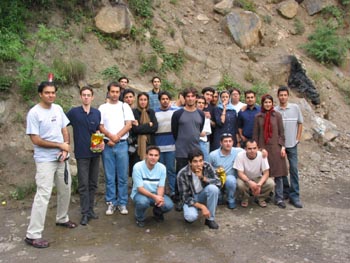Bob DuCharme has interesting articles about link typing
and Shepard’s Citations.
He says hypertext has not advanced. I think perfectionism is the cause of our mediocrity.
Hypertext experts tend to be purists rather than pragmatists. Take Xanadu is as a case study. Ted Nelson has a Grand Hypertext Vision that he’s been working on since the 1960s. Meanwhile, the web won with an evolutionary “worse is better” design.
I had similar Grand Visions for a my openreference project, but it’s become apparent that weblogs and xml are the path to better hypertext.
an Evolutionary Approach #
I’ve taken my brother’s elsewhere links as inspiration for an simple link management system. Here’s a few advantages:
- Simple: uses an existing product: Movable Type & bookmarklets
- Can be Published at a URL and syndicated
- Easy to include in other files. Example: My navbar [output] [template]
- server-based: stored in a relational database, replaces browser and machine dependent bookmarks
- easy to search and categorize
Link Classification is Moderation #
At first Categories will be Chaos. It will pain those used to controlled vocabularies, and disappoint those hoping for logically structured semantics; but subjective classification was actually a feature of file sharing.
The other thing to notice about link classification is that just as:
- Trackback implements notification; but is really distributed comments
- Openreference implements link management; but is really distributed moderation.
Take an example from kottke’s remainder links:
- url: http://cgi.fark.com/cgi/fark/comments-voteresults.pl?506790
- categories:
Or imagine the slashdot categories:
Distributed Voting #
Companies have tried to establish web site rating systems, but distributed ratings will not
work unless content and counting are decoupled so that:
- Voters can establish a reputation, using their own domain
- Counting implementations can compete
- Vote casting methods can be innovated
Doc Searls provoked my imagination:
“imagine what would happen if mute buttons on remote controls delivered”we don’t want to hear this” messages directly back to advertisers.”
Broadcast networks and web sites are not about to design a method to hear the audience’s “boos”; and it would be comical to establish an engineering task force for such a purpose.
Instead I propose a RESTian approach
Notification #
- Proposed Syntaxfor notifying publishers that do not implement Trackback:
https://www.nytimes.com/2003/05/18/weekinreview/18NUNB.html ?vote=boo &voter=http:/www.openpolitics.com/tim/ &categories=uninformed &commentURL=http://www.freedom-to-tinker.com/archives/000390.html
- get may not be a contract, but it is can be notification of an insult or a compliment
- Eventually some managers will start to ask their techies to check their server logs to see what people think of their site. A few of the results may be useful, but notification is not as important as publication.
Publication #
- on the internet, secret ballot pinging is mob rule
- If you stand behind your opinions, publish them in a machine readable format.
- RSS seems like a good format. I’d like to hear your schema suggestions
Aggregation #
- Vote counting on the internet has it’s own forms of “hanging chad” problems. The best way to deal with them is allow anyone to write their own vote counting program. Blogdex and Daypop are two existing implementations. Richer voting content would simply encourage more implementations and greater quality.
Correction
I while back, I got a trackback from Bob DuCharme. His writing is much more nuanced that the words I put in his mouth. #
Here’s the actual text:
In fact, none of the taxonomies I know of have improved on the one described twenty years ago by Randall Trigg in chapter four of his University of Maryland Ph.D. dissertation *
In one sense, the stickers they produced in 1873 were already more sophisticated than web links, because if more than one case had cited the same case, the sticker for that case added a one-to-many link to it. *






